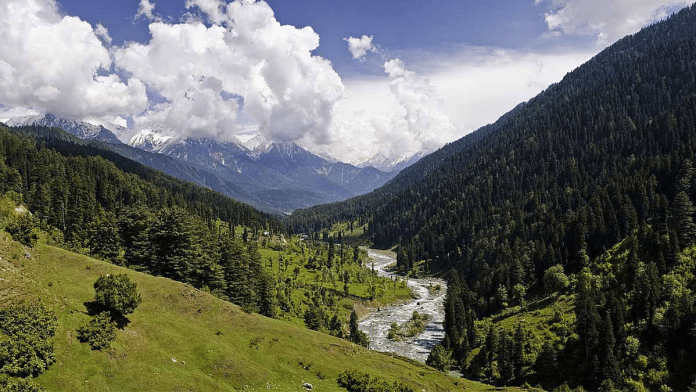Thank you dear subscribers, we are overwhelmed with your response.
Your Turn is a unique section from ThePrint featuring points of view from its subscribers. If you are a subscriber, have a point of view, please send it to us. If not, do subscribe here: https://theprint.in/subscribe/
Who would have thought that reservation—a policy designed to uplift the marginalised—would ever be used as a tool to marginalise others? In Jammu and Kashmir, this unsettling question is no longer hypothetical.
In today’s Kashmir, the very promise of social justice and affirmative action is being twisted into a mechanism of systematic exclusion. This exclusion isn’t coming through coercion, but through policy. In the name of inclusion, a large segment of the population is being rendered invisible. Scratch the surface, and a far more uncomfortable reality emerges: affirmative action, originally meant to uplift the historically disadvantaged, is now being deployed as a political tool to sideline others.
At the heart of this issue lies a profound contradiction. While the abrogation of Article 370 was projected as a step toward integration and equal opportunity, the post-370 policies in J&K reveal something starkly different. What we are witnessing in the form of the new reservation policy is not inclusion, but a new form of punitive politics—where the system selectively withholds opportunities from particular region under the guise of affirmative action.
A major transformation in Kashmir’s employment landscape has sparked political outrage. The General Category population—accounting for approximately 70%—has now been reduced to just 33–37% in representation, while nearly 70% of government jobs are reserved. In Kashmir, where caste-based categorisation was historically absent due to the region’s social structure, most aspirants traditionally competed under open merit. That space has now been drastically reduced to bare minimum.
This means the bulk of government jobs will now go to reserved categories, many of which are structured in ways that allinates the Kashmiri speaking population. Categories that have recently been expanded and are largely concentrated in other parts of Jammu and Kashmir, especially the Jammu division. Data shows that categories like ALC (Actual Line of Control residents), SC-1, SC-2, and EWS (Economically Weaker Sections) are largely favouring Jammu region.
Spatially speaking, the consequences of this policy are stark in Kashmir, where thousands of youth prepare for government jobs amid a lack of alternative opportunities. Kashmir already suffer from massive unemployment, a stagnant and overcrowded agricultural economy due to land fragmentation, and minimal access to the private sector. Government jobs remain one of the few viable paths to economic dignity—but even that space is being closed off. This alienation, rooted in multiple deprivations, can prove to be a ticking time bomb in these highly volatile regions which have been hotbeds of uncertainty in the past.
As the new reservation policy will finally settle, the likely outcome will be that the people from Kashmir find themselves completely excluded from the representation in jobs and education in their region in particular and in J&K in general. An anxious feeling of being left out is emerging in these areas about reasons for their potential exclusion.
Ironically, this exclusion is unfolding at a time when the state claims to be building peace and cementing integration. But peace built on humiliation, exclusion, and shrinking access is a fragile peace. History has shown that political alienation paired with economic despair does not lead to compliance—it breeds alienation, fuels sentiments of anarchy & takes the people away from democratic process.
This isn’t about opposition to reservation. It’s about perceptions that how affirmative action is being manipulated to systematically exclude entire communities from access, opportunity, and representation—especially those who have already paid the highest price during decades of turmoil.
It has to be noted that when reservation becomes a tool to erase rather than include, it betrays the very idea of justice and fairness embodied in our constitutional practice and spirit.
Jobs, political representation, and developmental priorities, critics argue, are being subtly shifted away from the region. They see this exclusion is bureaucratic, notllby force, but through policies that many feel are designed to silently disempower a community.
This growing perception — that integration is territorial but not human — can prove deeply damaging to long-term efforts at reconciliation and genuine inclusion. These discourses should be proven misplaced and pushed into oblivion through an immediate course correction by ensuring a resolution of the reservation issue based on fairness and justice, for long-term stability in Kashmir and in the national interest.
The long-term consequences of this policy, if not course corrected, won’t remain buried in bureaucratic files. They will manifest on the ground—in frustration, alienation, and possibly radicalisation. A peace process that leaves the majority voiceless cannot be called as peace; it will be deemed as quiet marginalisation. Kashmiris struggling against this reservation policy do not seek privilege—they demand parity. And that begins with a rationalised reservation policy that uplifts rather than punishes, includes rather than isolates, and listens rather than silences.
These pieces are being published as they have been received – they have not been edited/fact-checked by ThePrint.



While, I do agree with you on the subject matter. But please refrain from using AI for writing an entire article.